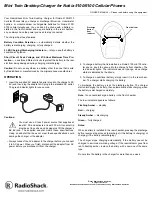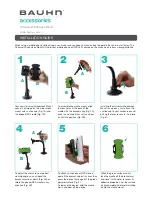
41
For example, time is a key factor in how much exposure a person receives.
Those persons who spend long periods of time on their hand-held mobile
phones could consider holding lengthy conversations on conventional phones
and reserving the hand-held models for shorter conversations or for situations
when other types of phones are not available.
People who must conduct extended conversations in their cars every day
could switch to a type of mobile phone that places more distance between
their bodies and the source of the RF, since the exposure level drops off
dramatically with distance. For example, they could switch to a mobile phone
in which the antenna is located outside the vehicle, a hand-held phone with a
built-in antenna connected to a different antenna mounted on the outside of
the car or built into a separate package, or a headset with a remote antenna
to a mobile phone carried at the waist. Again, the scientific data do not
demonstrate that mobile phones are harmful. But if people are concerned
about the radiofrequency energy from these products, taking the simple
precautions outlined above can reduce any possible risk.
Where can I find additional information?
For additional information, see the following websites:
•
Federal Communications Commission (FCC) RF Safety Program (select
“Information on Human Exposure to RF Fields from Cellular and PCD Radio
Transmitters”):
http://www.fcc.gov/oet/rfsafety
•
World Health Organization (WHO) International Commission on Non-
Ionizing Radiation Protection (select Qs & As):
http:// www.who.int/peh-emf
•
United Kingdom, National Radiological Protection Board:
http://www.nrpb.org.uk
•
Cellular Telecommunications Industry Association (CTIA):
http://www.wow-com.com
•
U.S. Food and Drug Administration (FDA) Center for Devices and
Radiological Health:
http://www.fda.gov/cdrh/consumer/
1
Muscat et al. “Epidemiological Study of Cellular Telephone Use and Malignant Brain Tumors”. In:
State of the Science Symposium; 1999 June 20; Long Beach, California.
2
Tice et al. “Tests of mobile phone signals for activity in genotoxicity and other laboratory assays”.
In: Annual Meeting of the Environmental Mutagen Society. March 29,1999, Washington, D.C. and
personal communication, unpublished results.
3
Preece, AW, Iwi, G, Davies-Smith, A, Wesnes, K, Butler, S, Lim, E, and Varey, A. “Effect of a
915-MHz simulated mobile phone signal on cognitive function in man”. Int. J. Radiat. Biol., April 8,
1999.
3
Hardell, L, Nasman, A, Pahlson, A, Hallquist, Aand Mild, KH. “Use of cellular telephones and the
risk for brain tumors: a case-control study”. Int. J. Oncol., 15: 113-116, 1999.



































